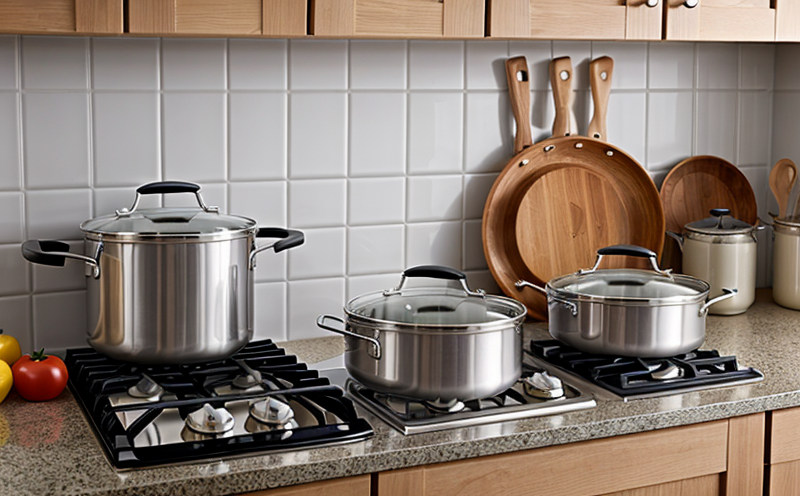Microbial Growth Resistance Testing in Kitchenware
The demand for safe and hygienic kitchenware has seen a significant increase over recent years. Consumers are becoming more aware of the potential risks associated with microbial contamination, especially in surfaces that come into direct contact with food. Microbial growth resistance testing is designed to ensure that products meet stringent hygiene standards and safeguard end-users from harmful bacteria.
Microbial growth resistance tests assess how well a material or surface resists bacterial colonization. This is particularly important for kitchenware, where frequent handling and moisture can create ideal conditions for microbial proliferation. The test involves exposing the kitchenware to specific microorganisms under controlled conditions, then evaluating the extent of any microbial growth.
Materials commonly tested include stainless steel, silicone rubber, plastic, and non-stick coatings used in cookware and bakeware. Testing helps manufacturers identify robust materials that can withstand repeated cleaning and use without fostering bacterial colonies. This not only enhances product safety but also increases consumer trust and satisfaction.
The testing process typically involves selecting appropriate microorganisms such as Escherichia coli, Salmonella, or Staphylococcus aureus based on the intended use of the kitchenware. Specimens are then inoculated with these pathogens in a laboratory setting to simulate real-world conditions. After incubation periods ranging from 24 hours to several days depending on the microorganism, the specimens are visually inspected and quantitatively analyzed for microbial growth.
Advanced instrumentation like ATP bioluminescence systems can provide rapid, non-destructive assessments of surface cleanliness and potential bacterial presence. These tests help ensure that products meet hygiene standards set by international organizations such as the World Health Organization (WHO) or national regulations enforced by bodies like the Food Standards Australia New Zealand (FSANZ).
Manufacturers benefit greatly from microbial growth resistance testing as it allows them to make informed decisions regarding material selection and surface treatment. By incorporating antimicrobial agents into their products, they can create safer kitchenware that reduces the risk of cross-contamination during food preparation.
The importance of this test extends beyond just meeting regulatory requirements; it also plays a crucial role in enhancing brand reputation and customer confidence. A growing number of consumers are seeking out brands committed to producing hygienic products, making microbial growth resistance testing an essential component of product development strategies.
Applied Standards
The kitchenware industry adheres to several international standards that guide the conduct and interpretation of microbial growth resistance tests. These include:
- ISO 18183-2:2013 - Microbiological quality of articles intended for contact with food - Part 2: Bacterial adhesion to surfaces.
- ASTM E2345-18 - Standard practice for determining the resistance of materials used in articles intended for contact with food to bacterial adhesion and growth.
- EN 62297 - Resistance to bacterial adhesion and growth of materials used in articles intended for contact with food.
These standards provide detailed protocols on how to perform microbial growth resistance tests, including the types of microorganisms that should be used, duration of exposure, and methods for quantifying microbial growth. Compliance with these standards ensures consistency across different manufacturers and regions, thereby enhancing consumer trust in kitchenware products.
Why Choose This Test
Microbial growth resistance testing is an indispensable tool for ensuring the safety and longevity of kitchenware. Here’s why it should be part of any manufacturer's quality assurance program:
- Informed Material Selection: Identifies materials that effectively resist microbial colonization, aiding in the development of safer products.
- Enhanced Product Safety: Reduces the risk of contamination during food preparation and consumption.
- Better Consumer Trust: Demonstrates commitment to high hygiene standards, which is increasingly important for brand reputation.
- Regulatory Compliance: Ensures adherence to international health and safety regulations.
In addition to these benefits, microbial growth resistance testing helps manufacturers differentiate their products in a crowded market. By offering kitchenware that is proven resistant to microbial growth, they can attract consumers looking for the safest possible options for food preparation.
Customer Impact and Satisfaction
The results of microbial growth resistance testing directly impact customer satisfaction by delivering safer products. When customers use kitchenware that has passed these tests, they are assured that their food is less likely to be contaminated with harmful bacteria. This confidence can lead to higher customer loyalty and positive reviews.
Moreover, satisfied customers are more likely to recommend the product to others, extending the reach of the brand through word-of-mouth marketing. For manufacturers, this translates into increased sales and a stronger market position. The peace of mind provided by microbial growth resistance testing can also foster long-term relationships between companies and their customers.
From an operational perspective, passing such rigorous tests can streamline certification processes and reduce the time to market for new products. This agility allows businesses to stay competitive in dynamic markets where consumer expectations are constantly evolving.





